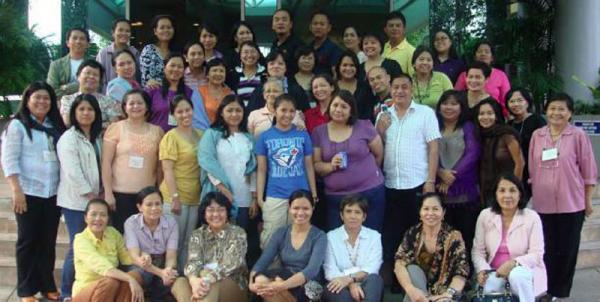GREAT Women Project organizes trainers’ pool on gender analysis and women’s empowerment

GREAT Women Project technical advisers from provincial and municipal technical working groups, non-government organizations, academe, government sectors and select NCRFW staff trained on gender analysis to enhance skills in analyzing gender responsiveness of policies, plans and programs of LGUs and national government agencies using gender analysis tools. The GREAT Women Project held a five-day orientation and workshop on the application of different gender analysis tools at Meralco Learning and Development Center (MMLDC) last September 21-25, 2009.
Through the GREAT Women Project training, the National Commission on the Role of Filipino Women formed a 41-member Technical Advisers’ Pool on Gender Analysis.
The GREAT Women Project organized the trainers’ pool as part of building an enabling environment for women entrepreneurs. Its gender analysis-trained technical advisers will be primed to serve as GREAT Women Project consultants and trainers. These trainers may be deployed as gender resource persons to local government project sites and later, across the nation to provide gender perspective-infused technical assistance. Participating technical advisers consisted of recognized professionals engaged in various themes of women’s economic empowerment, such as sustainable local economic development, governance and environment.
The resource persons were Ateneo de Davao University Prof. Rosena Sanchez as the main facilitator, CIDA GREAT Women Project Manager Luzviminda Villanueva, Technical and Services Division Chief Lorelie Astrera and Monitoring and Evaluation Division Planning Officer III Gemma Ifurung. Specific gender analysis tools applied were Harmonised Gender and Development Guidelines (HGADG), CDP Supplemental Guide, Gender Mainstreaming Evaluation Framework (GEMEF), Gender Responsive LGU (GeRL) Ka Ba. Other tools practiced were those for reviewing microfinance policies and business support services. CIDA Gender Adviser Jeanne Frances Illo monitored the training, while GWP Component 3 Consultant Manuela Silva contributed to the learning session on gender analysis.
Participating technical advisers directly applied gender analysis to current Project case studies, with their tips and learnings to be soon packaged as a compendium guide for technical advisers in drafting and reviewing project proposals and policies using a gender lens. The training yielded recommendations on how national and local agencies can be further gender-sensitized, and the GAD budget maximized toward better gender integration in national and local government expenditure. The training also recommended the immediate development of a tool to ensure gender responsiveness of Comprehensive Land Use Plans (CLUP).

